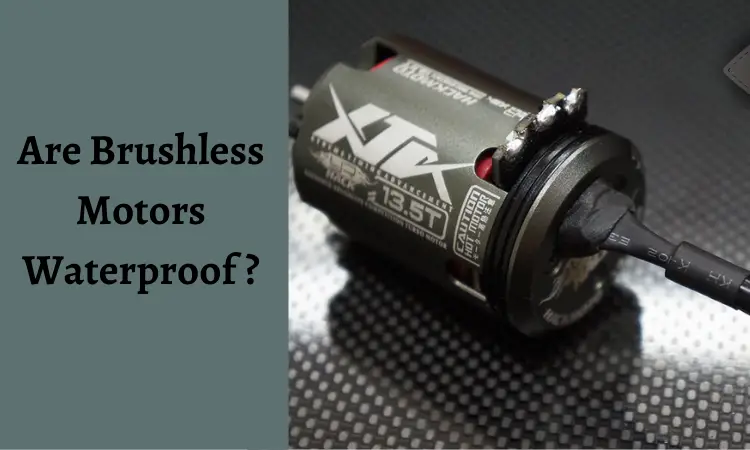You might have a brushless motor in your newly bought RC hydroplane or car. Or you are willing to buy one with a brushless motor that is exposed to water. We know this raises the doubt of whether these can resist water or not.
So it comes to mind- Are brushless motors waterproof?
No. Brushless motors are not waterproof. They are, in fact, water-resistant. The sensor of brushless motors is extremely vulnerable to water. Water can cause contamination there. Plus, the wire jackets easily pull water towards it.
However, there are ways through which a brushless motor can work fine for 1-2 years, being exposed to water. We’ll discuss it later in our article.
So what are you waiting for? Let’s dig right in!
Contents
Why aren’t Brushless Motors Waterproof?
As we said earlier, brushless motors are water-resistant. They are not waterproof like brushed motors. This is one of the differences between brushless and brushed motors.
Brushless motors are made of a fixed coil and rotating magnets around them. These rotating magnets are permanent. There are magnets on the outside rotating shaft and on the rotating shaft.
Due to the Presence of Sensor
The problem with brushless motors is the sensor present on top of them. This sensor board is widely exposed to water. And once water touches it, there’s a high chance of contamination in it. There are solid-state magnetic field sensors. It faces corrosion when water goes into it.
The sensor board can also face corrosion due to water. Plus even if the sensor board is dried off. It’s very unlikely for the motor to work the next day.
Whereas, there’s no sensor board in brushed motors. This makes brushed motors waterproof, unlike brushless ones.
Penetration Through the Shaft
There are many small openings in a brushless motor. Water can easily penetrate through these. However, not all water is pure. There’s a lot of mud/dirt in water that can penetrate through the shaft of a brushless motor.
The shaft has a minimum of 2 bearings in a typical brushless motor. These bearings are free from penetration of debris. But, it’s not waterproof. Small debris can enter through the water to these bearings. This will disable the motor from working.
Penetration Through Wire Jacks
Now, this happens at certain times. Let’s say your brushless has run for some time. And now it has become warm. And at this very moment water touches outside of it.
When a warm metal is suddenly cooled off, there’ll be negative pressure building on it. This will pull in water through the wire jacks. The casing of brushless motors is pretty well sealed. But there are always ways in a motor system to let in water.
How Can Brushless Motors be Made Water Repellent?
Brushless motors can be made suitable to last longer than usual against water. There’s a way of doing that. It doesn’t guarantee how long it’ll work. But it’s seen to work for 1-2 years.
Using Dielectric Grease
Dielectric grease can be a good sealing agent to seal the sensor board of the motor. Not only the sensor board, in fact, it can be used at the lower casing too.
Before the motor will be around water, Dielectric Grease should be applied. The two sensitive parts of the sensor board and the lower casing should be covered with it.
Furthermore, the wire jacks can also be covered with it. But in this case, there always remains a slight possibility of water entering when you take your RC boat for a run.
Bonus Tip for Brushless Motor against Water
Now that you know how to make brushless motors water repellent, we’ll let you know some tips on how to maintain them.
Every time you take your brushless motored RC model out on a spin with water exposure, seal off with dielectric grease. We have said that before.
But after the ride is complete, make sure to dry it off by taking out the casing. After it’s completely dried, again apply the grease to the sensor board and jacks.
Furthermore, brushed motors are waterproof, unlike brushless motors. So if you don’t want to take all these hassles with brushless, go for a brushed motor. Make sure to pick the right brushed motor. Here are some of our recommendations for Brushless Motors:
| Image | Title | Price |
|---|---|---|
 | 3650 5200KV Sensorless Brushless Motor | Check Price |
 | Greartisan DC 6V 1500RPM N20 High Torque Speed Reduction Motor with Metal Gearbox Motor | Check Price |
FAQs
Now we’ll answer some of the most frequently asked questions regarding brushless motors.
Can you run a brushless motor backward?
Yes. a brushless motor can be run backward. There’s a pin on certain brushless motors. This pin helps in changing the direction. However, not all brushless motors have this ability.
What are the disadvantages of a brushless motor?
The disadvantages of brushless motors are water vulnerability and high cost. There’s also vibration at low speed. However, vibration is not seen at higher speeds.
Conclusion
We hope we’ve been able to enlighten you on brushless motors. And how they are not waterproof. Be sure to use brushless motors only if you are using plane-type boats (hydroplane deep vee, etc).
Thank you for staying with us till the very end. Do let us know if you have any queries.

